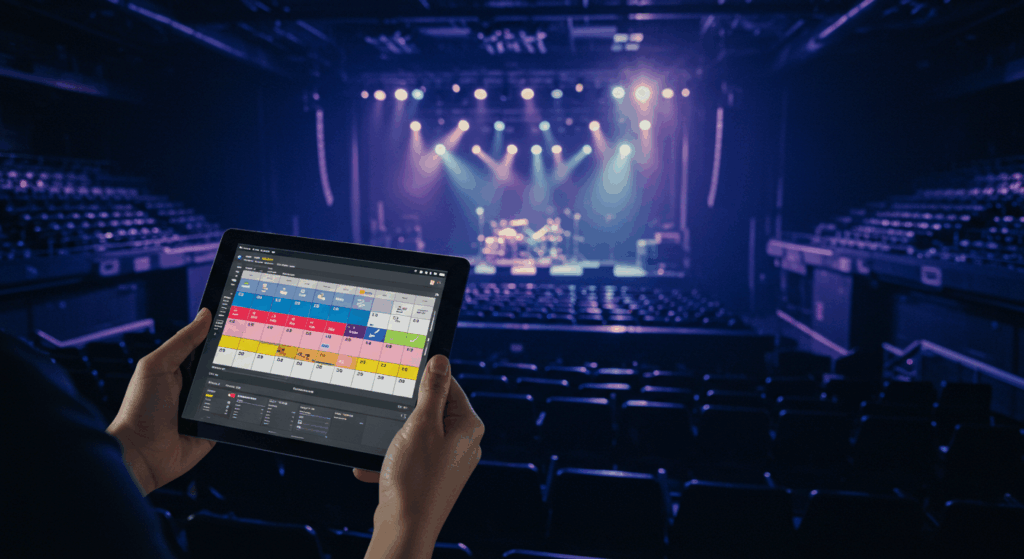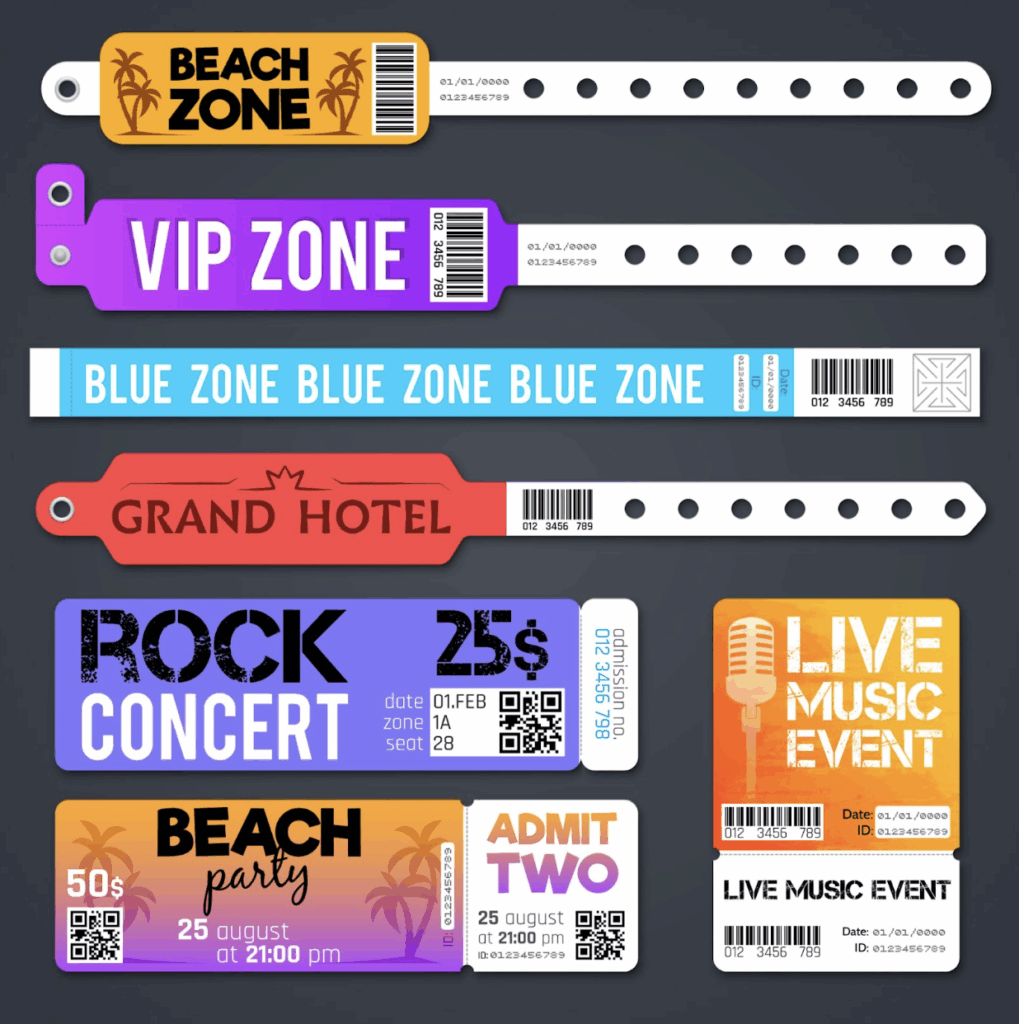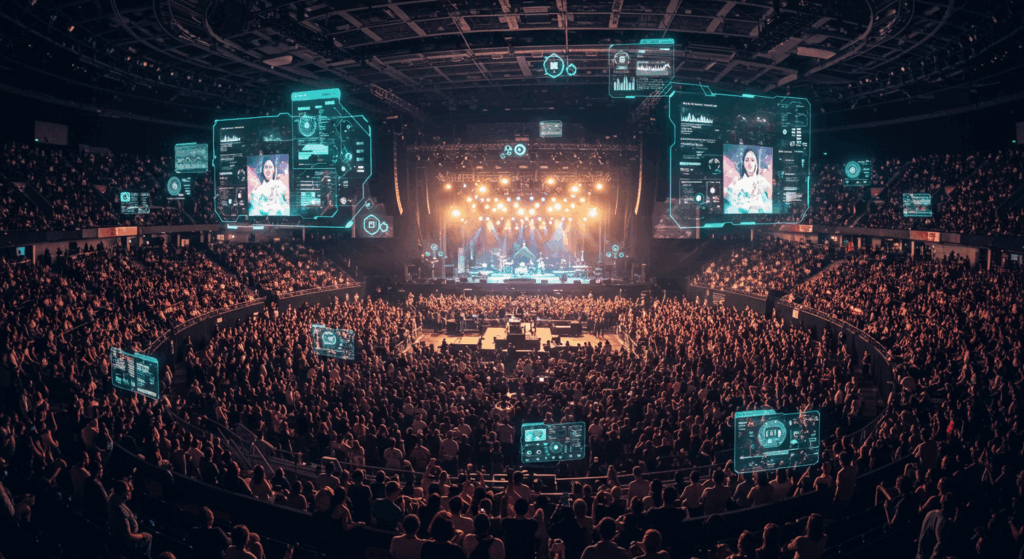
Future of Concert Event Management: Trends for 2025–26
The live music industry is experiencing unprecedented growth, but the game has fundamentally changed.
- AI-powered systems are revolutionizing every aspect of concert operations, from predictive crowd management to personalized fan experiences that adapt in real time.
- Contactless technologies and immersive AR/VR integration are baseline expectations for competitive venues.
- Data-driven personalization and sustainability mandates are forcing venues to completely rethink how they operate and connect with audiences.
- The venues that will thrive are those embracing unified, intelligent management platforms that eliminate the chaos of juggling multiple disconnected systems.
Running concerts the same way you did five years ago is like trying to book shows with a flip phone. The industry is moving at breakneck speed, and concert event management trends are evolving fast.
Live Nation reported a record $23.16 billion in revenue in 2024, and 151 million fans attended nearly 55,000 events. The live music industry is booming, but success now requires a completely different playbook. Today’s concerts demand intelligent, integrated solutions that can keep pace with both artist expectations and fan demands.
The venues crushing it right now are leveraging technology that makes the entire experience smoother, safer, and more profitable. From AI that predicts crowd flow before bottlenecks happen to personalized marketing that drives higher ticket sales, the concert event management trends defining 2025-26 are all about working smarter, not harder.
How is AI Revolutionizing Concert Event Management?
The biggest shift in concert event management trends is digital intelligence. AI in music events has moved into territory that’s genuinely transforming how venues operate.
Real-time crowd management powered by AI is already preventing the kind of disasters that used to shut down festivals. Advanced systems analyze crowd density through camera feeds, predict potential bottlenecks, and automatically adjust entry points before problems escalate. Venues like The Sphere in Las Vegas are using AI to create visuals that respond instantly to music and crowd energy, while systems analyze performer movements and audience reactions to sync lighting and effects in ways that would be impossible for human operators.
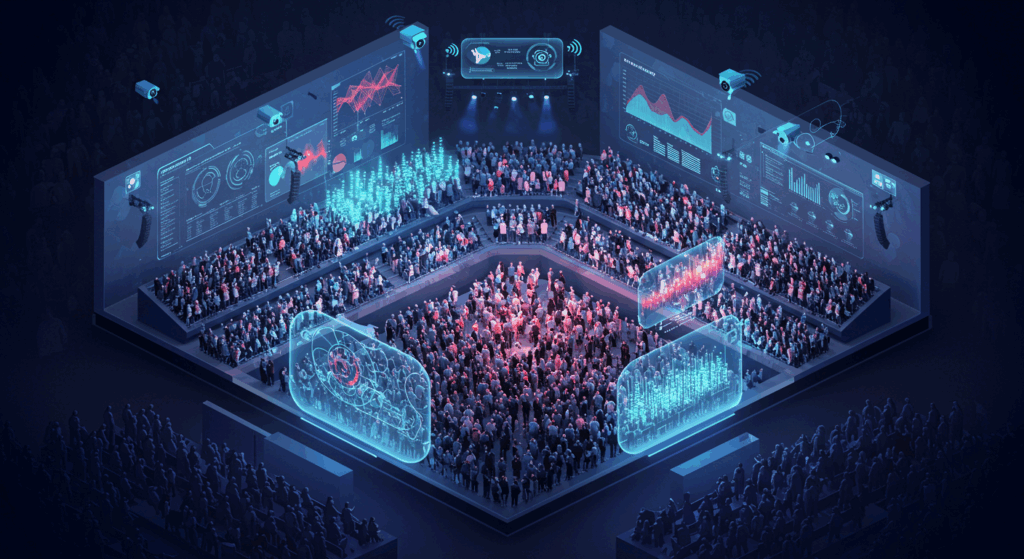
But here’s where it gets really interesting: AI-driven personalization is changing how venues connect with their audiences. Instead of generic email blasts, venues are using machine learning to analyze past attendance patterns, social media activity, and purchasing behavior to create hyper-targeted campaigns. Event managers report improvements in both ticket sales and audience satisfaction when they can deliver the right message to the right person at exactly the right time.
Predictive Analytics for Revenue Optimization
Venues leveraging AI can optimize pricing in real time, analyzing everything from weather forecasts to social media buzz to determine optimal ticket prices. We’re not talking about the controversial dynamic pricing that frustrates fans. It’s intelligent forecasting that helps venues maximize revenue while keeping shows accessible.
The most sophisticated systems can predict which shows will sell out weeks in advance, allowing venues to adjust marketing spend and staffing accordingly. They’re also identifying patterns in no-show rates, helping venues implement overbooking strategies that maximize capacity without compromising the fan experience.
What Live Event Technologies Are Transforming Concert Experiences?
Live event tech trends are reshaping every touchpoint of the concert experience, from the moment fans discover an event to long after they’ve left the venue.
Advanced mobile ticketing and biometric entry systems are streamlining venue access while creating new opportunities for fan engagement. These integrated systems enable cashless payments, real-time location tracking for optimized concession placement, and trigger location-based experiences that enhance the overall event journey.
Augmented reality is moving beyond gimmicky filters into practical applications that enhance the show. Fans can point their phones at the stage to access real-time lyrics, artist information, or choose between multiple camera angles. Some venues are experimenting with AR wayfinding that helps fans navigate complex festival grounds or find amenities without the chaos of traditional signage.
Immersive Sound and Visual Technologies
The technical production side is seeing equally dramatic innovations. Spatial audio systems are creating three-dimensional soundscapes that adapt based on where listeners are positioned in the venue. This technology, combined with AI-driven acoustic optimization, ensures every seat gets the best possible audio experience.
Visual technologies are becoming more sophisticated too. LED displays that adapt to ambient lighting conditions, drone light shows synchronized with music, and projection mapping that transforms venue architecture in real time are setting new standards for what fans expect from live events.
How Can Venues Use Data to Personalize Concert Experiences?
Progressive venues understand that every fan interaction generates valuable data, and they’re using that information to create experiences that feel personally crafted. This goes way beyond basic demographic targeting into behavioral analysis that predicts what individual fans want before they know it themselves.
Advanced customer relationship management systems are tracking fan preferences across multiple touchpoints. When someone consistently buys VIP packages for indie rock shows but general admission for electronic music, smart venues use that insight to customize offerings. The result is higher conversion rates and fans who feel like the venue genuinely understands their preferences.
Music venue management has evolved from simple booking coordination to sophisticated audience development. Venues are creating fan profiles that include everything from preferred drink choices to optimal communication timing, enabling personalized experiences that drive loyalty and repeat attendance.
Integration with Social Media and Streaming Platforms
Cutting-edge venues are integrating with streaming platforms to identify fans who’ve shown interest in similar artists, then targeting them with personalized invitations to upcoming shows.
Advanced systems monitor social conversations to identify trending artists before they break mainstream, giving venues a first-mover advantage in booking emerging talent. They’re also using social sentiment analysis to optimize everything from setlist suggestions to merch offerings.
Why Are Sustainability and Safety Critical for Modern Venues?
Environmental responsibility isn’t just good PR anymore. Concert event management trends in sustainability are being driven by both fan expectations and regulatory requirements, forcing venues to completely rethink their operations.
Modern venues are implementing comprehensive sustainability programs. Solar-powered stages, carbon offset programs integrated into ticket purchases, and partnerships with local farms for concession sourcing are becoming standard practice. Venues are using IoT sensors to continuously optimize energy usage, reducing costs while meeting environmental commitments.
Safety protocols have evolved beyond pandemic-era requirements. Advanced air filtration systems, real-time crowd density monitoring, and automated emergency response systems are now baseline expectations. Venues are using technology to create safety nets that operate invisibly in the background, maintaining the energy of live events while ensuring everyone goes home safely.
Health Monitoring and Emergency Response
AI-powered health monitoring systems can detect potential medical emergencies in crowds before they become critical. These systems analyze movement patterns, detect falls or distress, and automatically alert medical staff with precise location data.
Emergency response protocols now include real-time communication systems that can instantly notify all stakeholders, from security teams to artists, about any situation requiring immediate attention.
Are Hybrid Concert Models the Future of Live Music?
One of the most significant concert event management trends is the permanent integration of virtual components into live events. Instead of replacing in-person experiences, it’s about extending them to reach global audiences and create additional revenue streams.
Successful hybrid models offer virtual attendees genuinely different experiences rather than just livestreaming the live show. Multi-camera setups with director-quality production, virtual backstage access, and interactive elements that allow online fans to influence the live performance are setting new standards.
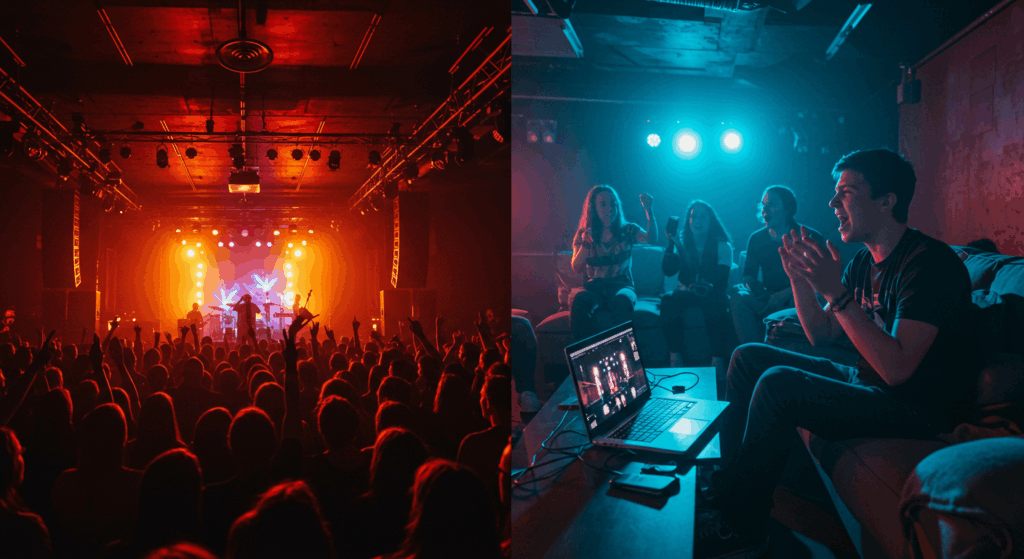
Venue planning now includes virtual capacity as a core consideration, with dedicated streaming infrastructure becoming as important as physical sound systems. The most forward-thinking venues are designing spaces that accommodate both live audiences and broadcast production from the ground up.
Monetizing Virtual Attendance
Smart venues are creating tiered virtual experiences that can generate significant revenue. Premium virtual packages might include artist meet-and-greets, exclusive content, or limited-edition digital merchandise that’s only available to online attendees.
The key is treating virtual attendance as its own complete experience rather than a discount alternative to being there in person. When done right, hybrid events can double total audience capacity while creating new marketing opportunities and revenue streams.
What Technologies Do Concert Venues Need for 2025-26?
The venues dominating the industry have moved beyond piecemeal solutions to comprehensive technology ecosystems. Here are the game-changing tools that define successful concert operations:
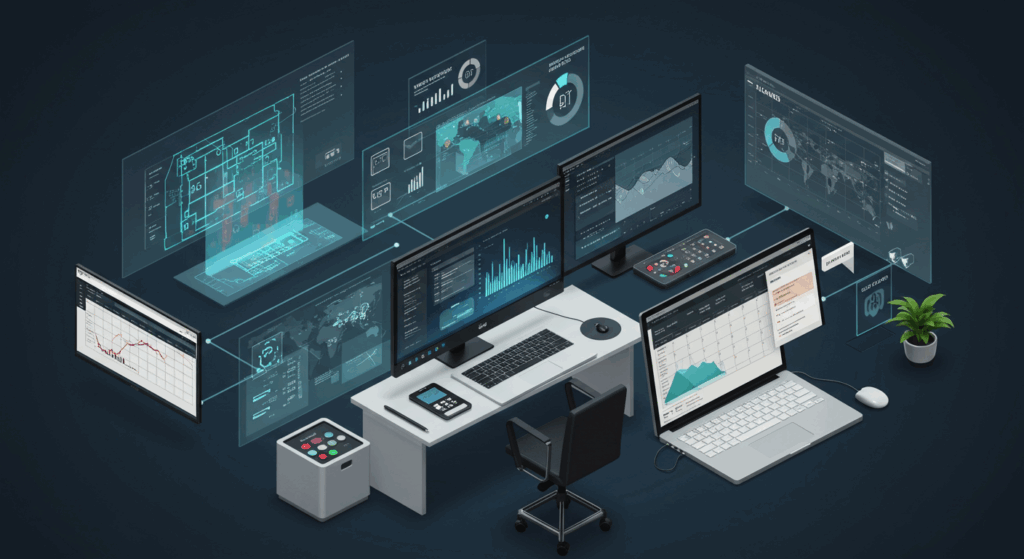
- Unified Event Management Platforms – Integrated systems that handle everything from booking to settlement, eliminating the chaos of managing multiple disconnected tools
- AI-Powered Crowd Analytics – Real-time monitoring systems that predict and prevent overcrowding, optimize flow patterns, and ensure safety without compromising the experience
- Dynamic Revenue Optimization Tools – Intelligent pricing and inventory management that maximizes revenue while maintaining accessibility for different fan segments
- Integrated Marketing Automation – Personalized communication systems that deliver the right message to the right fan at precisely the right moment in their decision journey
- IoT Environmental Controls – Smart systems that optimize everything from lighting to HVAC based on real-time conditions and attendance levels
- Blockchain-Secured Ticketing – Anti-fraud systems that eliminate scalping while providing fans with verified, authentic tickets and collectible digital experiences
- Advanced Production Integration – Systems that coordinate sound, lighting, and visual effects with AI precision, creating seamless technical experiences
The venues that will thrive have the most cohesive technological ecosystems. Every system works together, sharing data and creating experiences that feel effortless for both fans and staff.
Frequently Asked Questions
What are the most important concert event management trends for 2025? The biggest trends include AI-powered operations, contactless fan experiences, data-driven personalization, sustainability integration, and unified management platforms. Venues that master these areas will have significant advantages in efficiency, profitability, and fan satisfaction.
How is AI changing music venue operations? AI in music events is revolutionizing crowd management, personalizing fan experiences, optimizing pricing strategies, and automating routine tasks. From predictive analytics that prevent bottlenecks to intelligent lighting systems that sync with performances, AI is making venues smarter and more responsive.
What live event tech trends should venues prioritize? Essential technologies include contactless entry systems, real-time crowd analytics, integrated payment solutions, AR/VR capabilities, and IoT-powered environmental controls. The key is choosing technologies that integrate seamlessly rather than adding complexity.
How can venues effectively implement hybrid concert models? Successful hybrid events require dedicated streaming infrastructure, multi-camera production capabilities, and virtual experience design that offers unique value to online attendees. The goal is to create complementary experiences for both live and virtual audiences rather than simply broadcasting the live show.
What should venues look for in concert management software? The best solutions are built specifically for the music industry, offering integrated booking, financial tracking, artist advancement, and settlement capabilities. Look for platforms that handle industry-specific challenges like co-promoter relationships and complex revenue sharing rather than generic event management tools.
How Can Venues Lead the Concert Management Revolution?
Organizations that embrace these concert event management trends will find themselves with sustainable competitive advantages: higher profit margins, more engaged audiences, and operational efficiency that seemed impossible just a few years ago.
Operations still running with spreadsheets, email chains, and manual processes are actively handicapping themselves in an industry where every detail matters. While they’re spending hours on administrative tasks that could be automated, their competition is focusing on what actually drives revenue: building relationships, curating amazing experiences, and growing their audiences.
The music industry has always been about connecting artists with audiences, but the tools for making those connections have evolved. Success requires platforms built specifically for the unique challenges of concert management. Generic event software can’t handle the complexity of co-promoter relationships, artist advancement requirements, and the intricate financial structures that define live music operations. Specialized solutions like Prism offer industry-specific tools that turn operational chaos into streamlined success. Get started today with a free demo.

Matt Ford is the founder and CEO of Prism.fm, an Austin-based software company revolutionizing live music event management. With a background in entrepreneurship and a degree from the University of Wisconsin-Madison School of Business, Ford combined his self-taught coding skills with firsthand experience as a concert promoter to address the inefficiencies he observed in the industry. In 2018, he launched Prism.fm, an all-in-one platform designed to streamline operations for venues, promoters, and agencies by replacing cumbersome spreadsheets with integrated tools for booking, financial tracking, and contract management. Under his leadership, Prism.fm has grown significantly, achieving $3 million in annual recurring revenue post-COVID and securing over $15 million in funding . Ford’s commitment to building user-centric solutions has positioned Prism.fm as a trusted partner for over 1,500 venues and promoters worldwide.

